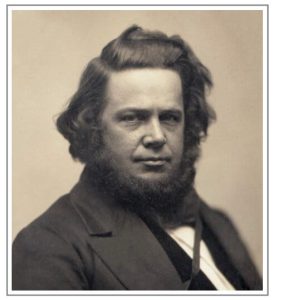
26 Dec How the Zipper Got Its Name: Four Elements of a Great Name
Naming is Framing

Elias Howe
As I sit here today, the clothes I am wearing have three different zippers and the messenger bag I’m carrying has another five. The zipper is an amazingly useful invention that has had universal appeal. Today, 4.5 billion zippers are produced each year. But the zipper wasn’t a hit right off the bat. It took 70 years for the device to be perfected — and for the right name to carry it to fame.
In 1851, Elias Howe developed a device called the “automatic continuous clothing closure.” His invention was a flop and pretty much forgotten about until 1890, when Whitcomb Judson was awarded a patent for an improved device called the “chain lock fastener.” This name still didn’t get much traction, and in 1893, Howe’s improved “clasp locker” earned patent protection. He featured it at the 1893 World’s Fair in Chicago and started a company called, “The Universal Fastener Company,” which later became the “Automatic Hook and Eye Company,” which later became the “Hookless Fastener Company.”

BF Goodrich
It wasn’t until 1923, that Benjamin Franklin (BF) Goodrich saw the invention and liked the “zipping” noise it made. He used these fasteners on the company’s new rubber boots and decided to call the new fastener a “zipper” — a brilliant name that stuck.
Zipper has all the elements of a great name and provides a great example for marketers faced with naming challenges. Great names then and now fit the criteria below.
Great Names are Evocative
When you are coming up with new names for products or companies, the most important question to ask is: What does this name remind you of? Our brains are built to hook new information onto a structure that already exists in our memory. New research suggests that new products are most successful when they are 80% familiar and 20% new. The word “zipper” evoked the speed or zip of the connection. It also evoked the sound the device makes when you “zip” it up. The name zipper sounds fast and fun.
Great Names are Unique & Memorable
Brand names and images essentially exist in our memory. We focus attention on things that are different from the expected patterns and remember these exceptions. There are very few words that start with the letter Z. Growing up, my name (Fritz Grutzner) was often a source of confusion to people and was never easy to pronounce, but as I got older I realized that it was more memorable because very few people had a name with two Zs in it.
Great Names are Ownable
Today, most people will find your brand or company through a Google search. It is essential that your name is easy to find. Naming your new product or organization requires walking a fine line between being fanciful and descriptive. Fanciful names, such as Amazon for a retailer, don’t describe the service they provide, but evoke something else. Descriptive names, such as The Reliable Insurance Company, win on accuracy by fail on ownability. Unique, fanciful names that evoke the benefit or experience you are going for, are often the ideal solution.
Great Names are Simple
We are all efficient (and lazy) thinkers. We are bombarded by stimuli all day long and don’t want to spend any extra energy thinking about things more than we have to. New names that are longer than two or three syllables simply make us work harder than we want to. Long names are also hard to remember. Brandgarten recently worked with an organization called, The Wisconsin Council on Children and Families. They were doing great work for kids but no one could remember (or stay awake for) their full name. We helped them get to a new name, “Kids Forward.” We often see nonprofit organizations which have made the mistake of giving themselves long, descriptive names in their first name iteration and later decide they need a shorter, more memorable name.
The next time you are faced with naming decision for your new product, brand or startup, remember the Zipper and ask yourself, “is this name evocative, unique & memorable, ownable, and simple?”
 Fritz Grutzner is president and founder of Brandgarten, a firm that specializes in uncovering the emotional drivers behind consumer behavior and using deep human insights to build powerful brand strategies. He can be reached at fgrutzner@brandgarten.com.
Fritz Grutzner is president and founder of Brandgarten, a firm that specializes in uncovering the emotional drivers behind consumer behavior and using deep human insights to build powerful brand strategies. He can be reached at fgrutzner@brandgarten.com.


